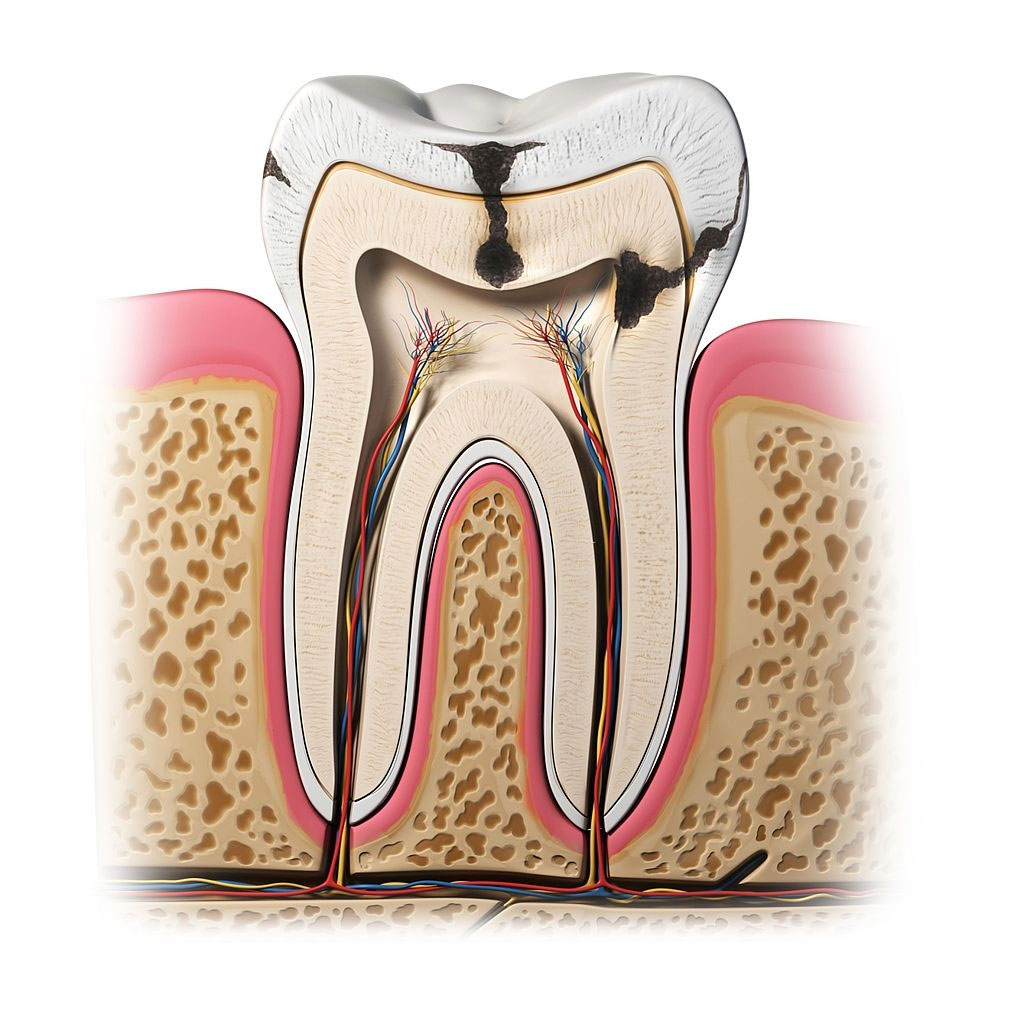It is the disinfection of the central core spaces of the tooth and subsequent placement of root filling to protect against infection.
A severe tooth-ache is often due to inflammation within the central nerve (pulpal) space of the tooth. The cause is often deep decay or cracking of the tooth. Because the inflamed pulp tissue is attempting to swell within the rigid confined space of the tooth; this type of acute toothache can be severe. If the toothache is from the pulp and is severe, continuous, unprovoked and/or requiring painkiller medication or affecting sleep it means root canal treatment may be recommended. Even if the tooth eventually settles with medication or other treatment, root canal treatment (RCT) is still required because the dead space within the tooth needs to be disinfected and filled so there is no recurrence of pain and inflammation.
It is now recommended by specialists that if impacted wisdom teeth need to be removed, this is best done between the ages of 14 and 22 years. At this time surgery is technically easier, patients recover more quickly and the risk of complications is much lower. This is a relatively easy procedure in a patient at the age of 20, however, it may become very difficult in a patient over 40 years of age.
The only alternative way to remove the infection would be to extract the tooth. It is usually important to replace extracted teeth as a missing tooth often leads to follow-on negative impacts in the mouth. Replacing an extracted tooth often involves complex and expensive treatments such as dental implants or dental bridgework.

Your dentist will recommend RCT only if there is a good chance it will last a long time. But as with all dental and medical treatments no guarantee can be given – each tooth and person is unique and there is always the chance of possible complications. Studies have shown the majority of root canal treatments to be successful. Usually if your painful tooth settles quickly after your first visit (within 48 hours of emergency removal of the infected pulp) the treatment continues uneventfully. Teeth for which root canal treatment was delayed and/or have developed chronic infections have a lower chance of success. Assessing the success of treatment requires review visits with x-ray checks to see if the bone around the tips of the roots are healing.
Root canal therapy is a comfortable procedure and quite similar to having a routine dental filling placed. Local anaesthetic is given to numb the tooth. However, it is not uncommon to experience discomfort after the visit, but this is usually managed with over-the-counter analgesic pain medication. Discomfort can also last a day or two after treatment, especially if you originally presented with a painful toothache.
Typically, treatment is done over several visits. The first visit is to soothe an acute toothache by removing the infected pulp. The second visit is to clean and disinfect the length of the tooth. The third visit is to fill the root canal spaces of the tooth. All visits require at least one radiograph (x-ray).
During visits your tooth will be isolated and protected from bacteria by the placement of a rubber sheet around it. You will be required to be able to keep your mouth open for the duration of visits. The height of your tooth may need to be shortened so it does not contact with opposing teeth. This will reduce trauma and the likelihood of tooth fracture.

Some possible complications of treatment are pain and discomfort, loss of the tooth due to fracture, breakage of the fine instruments used to clean the root canal spaces, over-filling or under-filling of root canal spaces, failure to eradicate infection and others.
All dentists are trained to carry out root canal treatment but specialist care may be recommended for you. Endodontists are specialist dentists who only perform Root Canal Treatment and you should expect a higher level of care from them. Your dentist will advise if you need to see a specialist endodontist for your tooth’s Root Canal Treatment.
When Root Canal Treatment has been completed a crown (cap) is often recommended as the permanent restoration. This is to prevent the tooth fracturing due to it being weakened by the need to remove decay and reach the core of the tooth to perform the tooth saving treatment. A reminder; after the RCT has been completed the tooth will need a permanent restoration (as soon as possible) due to the risk of the tooth breaking from biting / grinding forces. So until the permanent restoration is done, avoid using the affected side to reduce the risk of damage.
Root Canal Treatment (together with the cost of the permanent restoration) is usually less costly than extracting the tooth and replacing it with an implant or a bridge. A printed quotation will be given as a guide. Root canal treatment is categorized as “major dental services” by private health funds.